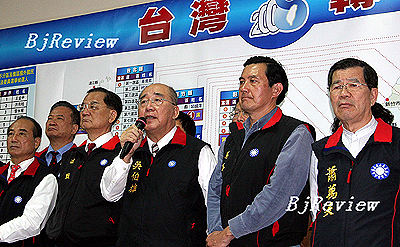|

Researcher Peng Weixue from the Institute of Taiwan Studies of the Chinese Academy of Social Sciences, and also Executive Editor in Chief of Taiwan Weekly, a publication affiliated to the research institute, comments on the outcome of the recently concluded "legislature" election in Taiwan and its impacts on relations across the Taiwan Straits.
Taiwan's "legislature" election, which is seen as a prelude for this year's "presidential" election on the island, was held on January 12. The ruling Democratic Progressive Party (DPP) suffered a landslide defeat to rival Kuomintang (KMT) in the campaign. The largest opposition party, KMT registered an overwhelming victory, taking 81 of the 113 seats in the "legislative Yuan" compared with 27 seats for the DPP. In the process the KMT tightened its grip over the top "legislative" body in Taiwan for the forthcoming four-year term.
Soon after the polling results were announced, Chen Shui-bian, the "pro-independence" Taiwan leader, announced his resignation as DPP chairman, taking responsibility for the worst election performance since the DPP was founded.
The Taiwan electorates' "no-confidence" vote to Chen and the DPP will have notable and profound impacts on Taiwan's political scene, the pending "presidential" election and cross-Taiwan Straits relations.
The election result can be mainly seen as the people of Taiwan's opposition to the DPP's "radical independence" policy and Chen's inability to improve the island's economy during his eight-year tenure. In this regard, a slowing economic growth, widening gap between the rich and the poor, and declining quality of life for locals speak for themselves.
Over the past years, a series of embezzlement scandals involving Chen and other senior DPP leaders have completely subverted their self-proclaimed image of "clean reformers." In previous elections at all levels, the DPP, led by Chen, always tried to grab votes by playing up "ethnic" politics. In the process he escalated antagonism among ethnic groups on the island, which has destabilized social order and hurt Taiwan's economy. Chen's provocative actions to push forward the so-called "constitutional reform" and "referendum on Taiwan's UN membership," with the aim to eventually realize "de jure Taiwan independence," have not only inflamed tensions across the Taiwan Straits, but also soured the island's relations with the United States and forced the latter to come up with clear opposition against such moves. Weary of the Chen and the DPP's desinification activities and incompetent governance, Taiwan residents dealt the party a heavy blow in the latest election, indicating their hopes for cross-Straits peace, development and social harmony.
With the outright win, the KMT has actually made itself closer to a victory in the "presidential" election due in March, with its candidate Ma Ying-jeou's approval rate remarkably boosted. The coalition of the KMT and its allies has been consolidated further. Now, besides the 81 seats in the "legislative Yuan," KMT members also hold 18 of 23 city/county government positions and leading posts in a majority of townships, amassing a relatively sharp edge in the grassroots political landscape. This is favorable for the KMT to become the ruling party again. In contrast, possible intra-party power struggles and debates on the party's guidelines will add to the DPP "presidential" candidate's difficulties to win back voters.
The increase in the KMT's strength to check "Taiwan independence" activities and growing calls for cross-Straits relaxation are conducive to stable and peaceful development of the mainland-Taiwan relations. For the KMT and its allies, three-fourths majority in the "legislative Yuan" enables them to veto any "constitutional reform" proposal that is oriented toward "de jure independence," thus preventing "pro-independence" forces from further destroying relations across the Taiwan Straits. Meanwhile, Taiwan residents' opposition to confrontation and their rising desire for closer cross-Straits links means new opportunities in many fields for cooperation. According to senior KMT leaders, if the party assumes the ruling power after the March election, it will seek to open direct air and shipping services between Taiwan and the mainland, raise quotas for Taiwan investment in the mainland and relax restrictions on visits by mainland tourists. The measures, if implemented, are surely to usher in a brand new chapter in the history of cross-Straits relations.
In addition, two referendums held concurrently with the January 12 election, one against corruption and the other demanding the KMT to return what was said to be assets illegally obtained from the people, were invalidated, because the voters' turnout, 26 percent, was far below the mandatory 50-percent requirement. This result indicates that Chen's campaign tactic to tie election with referendum, which he expected to become a major instrument for future "Taiwan independence" activities, has completely failed. |
